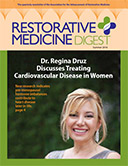[Sponsored by Restorative Formulations]
Every day, health care practitioners like you are bombarded with marketing from physician grade herbal supplement manufacturers. With the proliferation of products on the market — and significant competing information on quality standards, efficacy and more — how do you know who to trust? Until measures are taken to standardize industry testing methods and requirements, it’s crucial to “first, do no harm” — by thoroughly familiarizing yourself with the brands you offer. Here are some key considerations for evaluating the brands that you work with and some investigative questions you may want to ask.
Are there unwanted and unlisted ingredients in the supplement?
There is a common misperception that professional supplement brands use only organic herbs and herbal extracts. In reality, the majority of these products comprise herbs that are conventionally grown — which potentially exposes patients both to the chemicals found in pesticides and herbicides, and those found in the solvents used for extraction.
Because there is no legal requirement to include solvents on the label, most herbal manufacturers fail to disclose them. This means patients may unwittingly ingest the residues of Class 2 or Class 3 solvents, including, but not limited to, acetone, ethanol, hexane, chloroform, toluene, xylene and more. Some of these chemicals are used to dry clean clothes. Many have been identified by the state of California as known carcinogens, or as causing reproductive toxicity.
Clearly, you want to avoid recommending such products. But how do you ensure the ones you do recommend pass muster? Look for brands committed to using certified organic or wildcrafted herbs, preferably in majority. Strict certification guidelines prohibit the use of pesticides and herbicides in growing these herbs, which ensures your patients won’t be exposed to them. Further, the only permissible solvents for organic extraction include water, certified organic alcohol, and carbon dioxide.
Is the supplement effective?
When it comes to herbs and herbal extracts, potency is key to efficacy. Unfortunately, many brands rely on ingredients whose extract ratio — the amount of raw material required to produce one kilogram of extract — is substantially low. For example, in a supplement with an extract ratio of 2:1 (two kilograms of raw material yields one kilogram of extract), 50 percent of the extractable ingredients have made it into the final product. Higher ratios mean larger quantities of raw material are used—resulting in a more concentrated extract.
Potency also depends on constituent synergies. Some herbal supplements rely upon a single, standardized active ingredient extracted in isolation from the plant’s other constituents. In nature, however, plants contain multiple bioactive constituents that work together to provide whole-health benefits. Excluding these constituents from herbal products means that the original plant no longer works the way it was intended. And higher concentrations of a single active ingredient may have adverse effects in some patients, especially if they are taking other medications and supplements.
The most effective supplements, therefore, are based on whole herbs and include therapeutic doses (measured by extract ratio) that are high enough for rapid patient response.
What quality control measures are in place to assure both of the above?
Every manufacturer of herbal supplements is required by the Food and Drug Administration (FDA) to meet minimum good manufacturing processes (GMPs). Still, this does not necessarily mean a specific manufacturer is in compliance with the highest, current quality control practices. Processes that were cutting-edge ten years ago may not apply at all today.
This is why, for the sake of your patients, it is imperative to find and recommend products from manufacturers with proven, verifiable GMP status. In addition to those with high CGMP ratings, look for manufacturers that independently verify herbal concentrations and constituent biomarkers, and test for dangerous solvents, using cutting edge methodologies. Far too many manufacturers rely on third-party certificates of analysis from their suppliers, which may or may not be reliable, and which may be based on less accurate testing methods.
Finding a trusted manufacturing partner means you can confidently recommend supplements that work — and that really help your patients.
About Restorative Formulations
Restorative Formulations offers a range of therapeutic formulations with a focus on maximizing thyroid, endocrine, and cardiac function in the clinical setting for physicians. For more information please visit www.restorativeformulations.com, or call (800) 420-5801.
